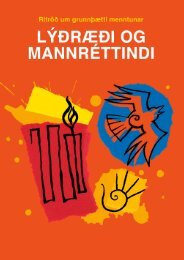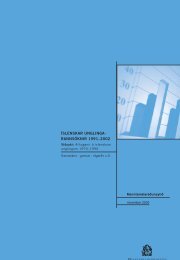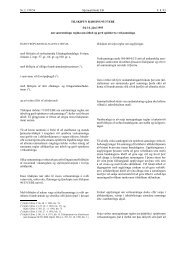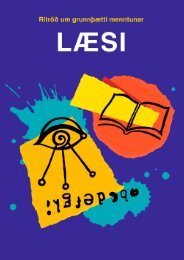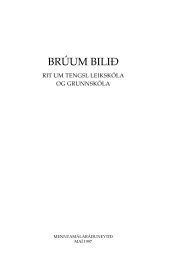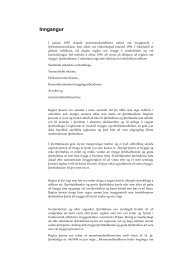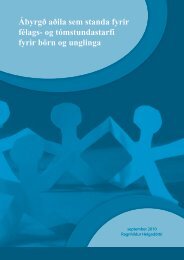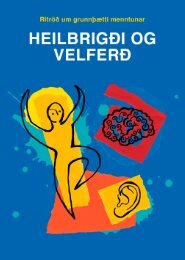Arts and Cultural Education in Iceland : Professor Anne Bamford
Arts and Cultural Education in Iceland : Professor Anne Bamford
Arts and Cultural Education in Iceland : Professor Anne Bamford
Create successful ePaper yourself
Turn your PDF publications into a flip-book with our unique Google optimized e-Paper software.
Executive Summary<br />
In 2008-09 an impact evaluative research was undertaken <strong>in</strong> Icel<strong>and</strong> to gather<br />
comprehensive data about the extent <strong>and</strong> quality of arts <strong>and</strong> cultural education <strong>in</strong> Icel<strong>and</strong>. The<br />
evaluation focused on the follow<strong>in</strong>g questions:<br />
What is be<strong>in</strong>g done <strong>in</strong> arts education <strong>and</strong> how is it be<strong>in</strong>g done?<br />
What is the quality of arts education <strong>in</strong> Icel<strong>and</strong>?<br />
What are the possibilities <strong>and</strong> challenges currently <strong>and</strong> <strong>in</strong>to the future?<br />
These questions were addressed through an <strong>in</strong>tensive six-month study us<strong>in</strong>g a comb<strong>in</strong>ation<br />
of qualitative <strong>and</strong> quantitative research methods. The focus of the research was on both formal<br />
<strong>and</strong> non-formal provisions of arts <strong>and</strong> cultural education. In the context of Icel<strong>and</strong>, this <strong>in</strong>cludes<br />
arts <strong>and</strong> cultural education with<strong>in</strong> schools <strong>and</strong> also the activities completed by children <strong>in</strong> a<br />
range of after school possibilities, <strong>in</strong>clud<strong>in</strong>g music schools, arts schools, local theatres <strong>and</strong><br />
museums <strong>and</strong> other providers. The research also <strong>in</strong>vestigated provisions <strong>in</strong> nursery years <strong>and</strong> for<br />
children with special learn<strong>in</strong>g needs. Implementation issues were explored, <strong>and</strong> a focus was<br />
given to teacher education <strong>and</strong> the professional development of both teachers <strong>and</strong> artists.<br />
Additionally, the research exam<strong>in</strong>ed the economic dimensions of the creative <strong>and</strong> cultural<br />
<strong>in</strong>dustries <strong>in</strong> the context of recent, broader changes political <strong>and</strong> economic conditions <strong>in</strong> Icel<strong>and</strong>.<br />
<strong>Arts</strong> education <strong>in</strong> Icel<strong>and</strong> is of high <strong>in</strong>ternational st<strong>and</strong>ard. It receives widespread support<br />
from pupils, parents <strong>and</strong> the community. There are generally adequate resources for effective,<br />
high quality arts education. Icel<strong>and</strong>ic education is dedicated to build<strong>in</strong>g skills <strong>and</strong> knowledge <strong>in</strong><br />
the arts forms, especially visual arts, music, wood craft <strong>and</strong> textile <strong>and</strong> to a lesser extent dance,<br />
drama, photography <strong>and</strong> film mak<strong>in</strong>g. <strong>Arts</strong> programmes <strong>in</strong> Icel<strong>and</strong> embed ideals of quality <strong>and</strong><br />
this is evident <strong>in</strong> the fluency with which most Icel<strong>and</strong>ic students are able to work with<strong>in</strong> the<br />
languages of the arts. Additionally, the arts scene <strong>in</strong> Icel<strong>and</strong> is characterised as be<strong>in</strong>g supportive<br />
with considerable levels of community <strong>in</strong>volvement <strong>and</strong> <strong>in</strong>dividual <strong>and</strong> collective freedom.<br />
There is a difference between, what can be termed, education <strong>in</strong> the arts (e.g. teach<strong>in</strong>g <strong>in</strong><br />
f<strong>in</strong>e arts, music, drama, crafts, etc.) <strong>and</strong> education through the arts (e.g. the use of arts as a<br />
pedagogical tool <strong>in</strong> other subjects, such as numeracy, literacy <strong>and</strong> technology). Schools need<br />
strong programmes <strong>in</strong> the arts AND artistic <strong>and</strong> creative ways to learn <strong>in</strong> an <strong>in</strong>tegrated way<br />
across the curriculum. More focus needs to be given to develop<strong>in</strong>g creativity <strong>in</strong> schools through<br />
creative approaches to learn<strong>in</strong>g, <strong>in</strong>clud<strong>in</strong>g <strong>in</strong> the arts. There is a lack of dist<strong>in</strong>ction made<br />
between arts education, creative education <strong>and</strong> cultural education. There is a mismatch<br />
between the broad def<strong>in</strong>itions of the arts generally with<strong>in</strong> Icel<strong>and</strong>ic society <strong>and</strong> the<br />
comparatively narrow def<strong>in</strong>itions of the arts with<strong>in</strong> education. More emphasis needs to be given<br />
for <strong>in</strong>tegrat<strong>in</strong>g creative learn<strong>in</strong>g across all curriculum areas.<br />
While Icel<strong>and</strong>ic pupils are skilled <strong>and</strong> confident <strong>in</strong> the processes of the arts, they are less<br />
confident <strong>and</strong> skilled <strong>in</strong> the presentation, description <strong>and</strong> critique of their arts mak<strong>in</strong>g. Process<br />
<strong>and</strong> product should be clearly l<strong>in</strong>ked. It is important that projects <strong>and</strong> learn<strong>in</strong>g l<strong>in</strong>es culm<strong>in</strong>ate <strong>in</strong><br />
a high quality presentation of the learn<strong>in</strong>g process. Celebratory events such as performances,<br />
exhibitions <strong>and</strong> presentations act as a powerful driver of quality enhancement <strong>and</strong> also can be<br />
an <strong>in</strong>fluential advocacy tool.<br />
Accessibility for all is a highly prized belief <strong>in</strong> Icel<strong>and</strong>ic education <strong>and</strong> arts education <strong>in</strong><br />
preschools, compulsory schools <strong>and</strong> secondary schools are available to all <strong>and</strong> strive to meet the<br />
needs of <strong>in</strong>dividual children. More consideration needs to be given for out-of-school (especially<br />
music) provisions for children with special needs. After school arts provisions espouse accessible<br />
8



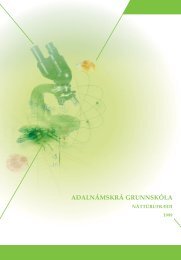
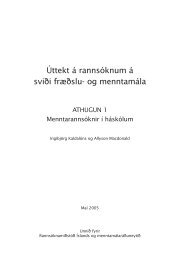
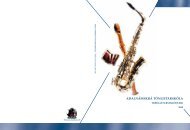
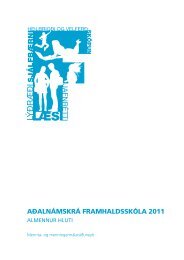
![Aðalnámskrá tónlistarskóla : rytmÃsk tónlist [Eingöngu á rafrænu formi]](https://img.yumpu.com/50843672/1/184x260/aaalnamskra-tanlistarskala-rytma-sk-tanlist-eingangu-a-rafranu-formi.jpg?quality=85)
